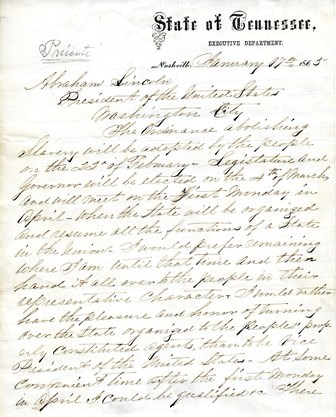|
Andrew Johnson was a man of many contradictions. He was a Southerner, and yet he firmly believed in the Union. He believed in the Union, yet he believed that many political decisions should be left to the individual states. He was a slave owner who was a product of his time, but he was also at one time a man called a "Moses" for the freedom of slaves in Tennessee. On January 1, 1863, Abraham Lincoln's Emancipation Proclamation freed slaves in states still in rebellion against the United States. Tennessee, although a seceded state, did not fall under the provisions of the proclamation. Tennessee was under Union control, and Andrew Johnson was serving as Military Governor. During the Civil War, Andrew Johnson's previous idea of slavery shifted: "Before the rebellion, I was for sustaining the Government with slavery; now I am for sustaining the Government without slavery, without regard to a particular institution. Institutions must be subordinate, and the Government must be supreme." October 13, 1864 While he was very much against the Southern aristocracy, Johnson revealed his sentiment on work ethic in the following statement. His primary concern was for the preservation of the Union, and he believed all else would fall in place afterwards. "In my opinion, freedom will not make negroes any worse, and will result in their advancement. I am for an aristocracy of labor, of intelligent, stimulating, virtuous labor; of talent, of intellect, of merit; for the elevation of each and every man, white and black, according to his talent and industry." October 13, 1864 According to tradition, Military Governor Andrew Johnson freed his personal slaves on August 8, 1863. By September 8, 1863, even the New York Times stated that "Gov. JOHNSON thus plants himself on the extreme Anti-Slavery ground --" On October 24, 1864, Johnson freed all the slaves in the state of Tennessee. 
An NPS Photo As Military Governor, Andrew Johnson worked tirelessly to reestablish a Union government in Tennessee. He wrote Abraham Lincoln on January 17, 1865 to see if his inauguration as Vice-President could be delayed: "The ordinance abolishing slavery will be adopted by the people on the 22nd of February. Legislature and the Governor will be elected on the 4th of March, and will meet on the first Monday in April, when the State will be organized, & resume all the functions of a state in the Union. I would prefer remaining where I am until that time, and then hand it all over to the people in their representative character. I would rather have the pleasure and honor of turning over the State, organized, to the people properly Constituted, than be Vice President of the United States." While President, Andrew Johnson struggled with Congress over the elements of Reconstruction. Many of his vetoes made in direct defiance of assistance for the freedmen, had their basis in his interpretation of Constitutional principles. In his veto of the Civil Rights Bill, for example, he stated that the act "...contains provisions which I can not approve consistently with my sense of duty to the whole people and my obligations to the Constitution of the United States." Learn more... |
Last updated: February 5, 2020
